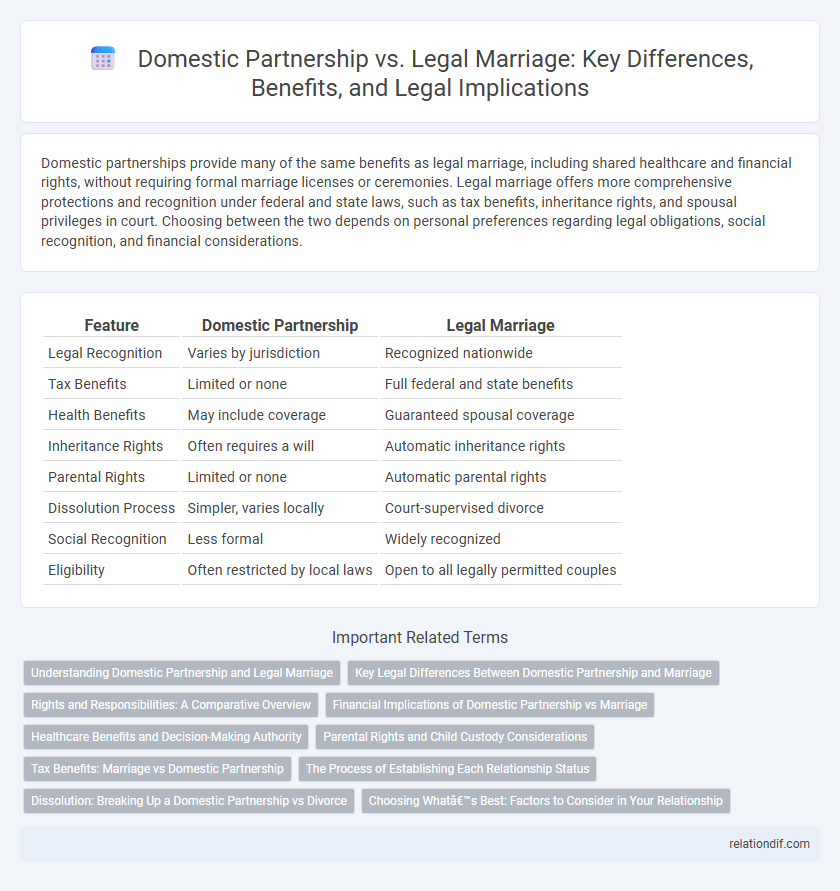Domestic partnerships provide many of the same benefits as legal marriage, including shared healthcare and financial rights, without requiring formal marriage licenses or ceremonies. Legal marriage offers more comprehensive protections and recognition under federal and state laws, such as tax benefits, inheritance rights, and spousal privileges in court. Choosing between the two depends on personal preferences regarding legal obligations, social recognition, and financial considerations.
Table of Comparison
| Feature | Domestic Partnership | Legal Marriage |
|---|---|---|
| Legal Recognition | Varies by jurisdiction | Recognized nationwide |
| Tax Benefits | Limited or none | Full federal and state benefits |
| Health Benefits | May include coverage | Guaranteed spousal coverage |
| Inheritance Rights | Often requires a will | Automatic inheritance rights |
| Parental Rights | Limited or none | Automatic parental rights |
| Dissolution Process | Simpler, varies locally | Court-supervised divorce |
| Social Recognition | Less formal | Widely recognized |
| Eligibility | Often restricted by local laws | Open to all legally permitted couples |
Understanding Domestic Partnership and Legal Marriage
Domestic partnership offers couples a way to legally recognize their relationship with some rights similar to marriage, often used by same-sex or unmarried partners. Legal marriage grants comprehensive rights and responsibilities, including tax benefits, inheritance rights, and spousal privileges recognized nationwide. Understanding the distinctions between domestic partnership and legal marriage is essential for making informed decisions about legal protections and obligations.
Key Legal Differences Between Domestic Partnership and Marriage
Domestic partnerships often provide limited legal benefits compared to marriage, such as restricted rights to inheritance, taxation, and decision-making authority in medical emergencies. Legal marriage confers comprehensive spousal rights, including federal benefits, joint tax filing, and automatic next-of-kin status. State recognition also varies, with marriage recognized nationwide while domestic partnership benefits depend on local laws.
Rights and Responsibilities: A Comparative Overview
Domestic partnerships grant limited legal rights compared to legal marriages, often excluding federal benefits such as Social Security survivor benefits and joint tax filing. Legal marriage provides comprehensive rights, including inheritance, hospital visitation, and spousal support obligations, which are enforceable by law. Responsibilities in legal marriages typically encompass shared financial duties and parental rights, while domestic partnerships may not guarantee these protections universally.
Financial Implications of Domestic Partnership vs Marriage
Domestic partnerships often provide limited financial benefits compared to legal marriage, such as lacking access to spousal Social Security benefits, joint tax filing, or automatic inheritance rights. Legal marriage offers comprehensive financial protections including shared health insurance, spousal tax deductions, and survivor benefits in retirement plans. Couples in domestic partnerships may face higher individual tax liabilities and limited access to family health coverage, impacting long-term financial planning.
Healthcare Benefits and Decision-Making Authority
Legal marriage provides spouses with guaranteed healthcare benefits, including access to family health insurance plans and spousal medical leave, whereas domestic partnerships may offer limited or no such coverage depending on state laws and employer policies. In terms of decision-making authority, legally married spouses have automatic rights to make medical decisions and access medical records, while domestic partners often require formal documentation like health care proxies or power of attorney to gain similar authority. These distinctions significantly impact healthcare access and decision-making rights in medical emergencies.
Parental Rights and Child Custody Considerations
Domestic partnerships often provide limited parental rights compared to legal marriages, particularly in areas such as adoption, custody, and decision-making authority. Legal marriage typically grants both partners automatic parental rights and equal standing in child custody disputes, ensuring stronger legal protections. Courts may scrutinize domestic partnerships more closely, potentially affecting custody arrangements and the recognition of parental responsibilities.
Tax Benefits: Marriage vs Domestic Partnership
Legal marriage offers substantial tax benefits such as joint filing of federal income tax returns, eligibility for spousal tax deductions, and access to tax credits like the Earned Income Tax Credit. Domestic partnerships generally do not qualify for these federal tax advantages, though some states may provide limited tax benefits to registered domestic partners. Couples in legal marriages benefit from lower tax rates and potential estate tax exemptions unavailable to most domestic partnerships.
The Process of Establishing Each Relationship Status
Establishing a domestic partnership typically involves registering with a local government or completing a formal declaration, often requiring fewer legal formalities and lower costs compared to legal marriage. Legal marriage requires obtaining a marriage license from the state, followed by a formal ceremony, and filing the marriage certificate with the appropriate government office to ensure full legal recognition. Domestic partnerships may have variable requirements depending on jurisdiction, while legal marriage processes are standardized nationwide in most countries.
Dissolution: Breaking Up a Domestic Partnership vs Divorce
Dissolution of a domestic partnership typically involves a simpler legal process than divorce, often requiring fewer court appearances and less paperwork. Unlike divorce, which legally ends a marriage and addresses complex issues such as property division, alimony, and child custody, domestic partnership dissolution may have limited legal obligations depending on the jurisdiction. Couples in domestic partnerships should review local laws to understand their rights and responsibilities during the breakup process.
Choosing What’s Best: Factors to Consider in Your Relationship
Domestic partnerships often provide legal recognition and shared benefits without the formalities of marriage, making them ideal for couples seeking flexibility. Legal marriage offers comprehensive rights related to property, inheritance, tax benefits, and parental responsibilities, essential for long-term security and family planning. Couples should evaluate factors such as financial implications, legal protections, social recognition, and personal values to determine the best option for their relationship goals.
Domestic Partnership vs Legal Marriage Infographic

 relationdif.com
relationdif.com